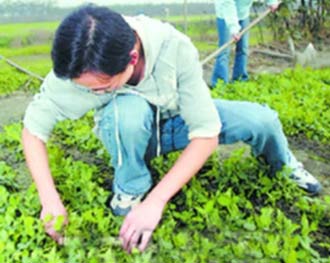| Home / Education / Photos | Tools: Save | Print | E-mail | Most Read |
| Students Turn to Bars, Farms to Get Credit Hours |
| Adjust font size: |
More than one thousand
Chen Qiang, a sophomore majoring in architecture, is the general manager of Leifeng Farm. Sixty of his classmates are working on the farm as Cheng's employees. According to the report, there are altogether six farms like this on campus being run by students. An additional 30 companies, with student shareholders, deal in laundry, retail and net cafe services on campus. The credits are dependent on how much money earned but also on daily performance, and they will shoulder no liability for any losses, according to Zou Guangyan, dean of "We are not doing this to make news; it's just an exploration of a new type of instruction," said Zou. Each farm has its own treasurer's office with students maintaining the account books. The accounting report from Leifeng Farm shows that the farm is still running in the red since its launch five months ago. "The major problem is to find new markets," said Chen, the general manager. He has dispatched five of this staff to find potential buyers on weekends. Their crop is mainly sold to the college refectories, whose demands are falling behind of their increasing output. Cheng Bo, a sophomore majoring in logistics, finds himself more like a boss than Chen as he is in charge of a more modern enterprise, the Shuiba bar. Shuiba, together with bookstores and laundries originally run by the college, handed management over to students on May 17 of this year. Cheng's team, comprised of himself and seven other fellow students from various departments, beat 40 rival teams during the management bidding process with an outstanding marketing plan that included management methods, marketing strategies and financial analysis. Cheng's bar has already paid back 12,000 yuan (US$1,533) of the college-sponsored loan, and the rent, including utilities, is paid to the college according to market prices. Cheng said the bar's financial statements had recently been audited by the Golden Abacus audit firm, also operated by students. In comparison to Cheng's bar, Chen's farm is not doing well. According to college regulations, the mangers will be replaced if they haven't been able fulfill their monthly based marketing plans for three consecutive months or there is a sharp deterioration in their academic records, while profit makers will get their bonuses at the end of the fiscal year. Although the credits can be earned by taking exams in related courses instead of working on farms or at bars, many students find this new method of gaining credits inappropriate. "We are here to learn, not to work," a student who posted on the college blog wrote. According to the report, one out of every four students is involved in the program. Zou said that although this instruction method is new in "We are providing our students with a chance to better know the competitive world to facilitate their growth as future entrepreneurs," said Zou. "We are hoping and praying that more and more students will join us." ( |
| Tools: Save | Print | E-mail | Most Read |
 |
| Related Stories |
